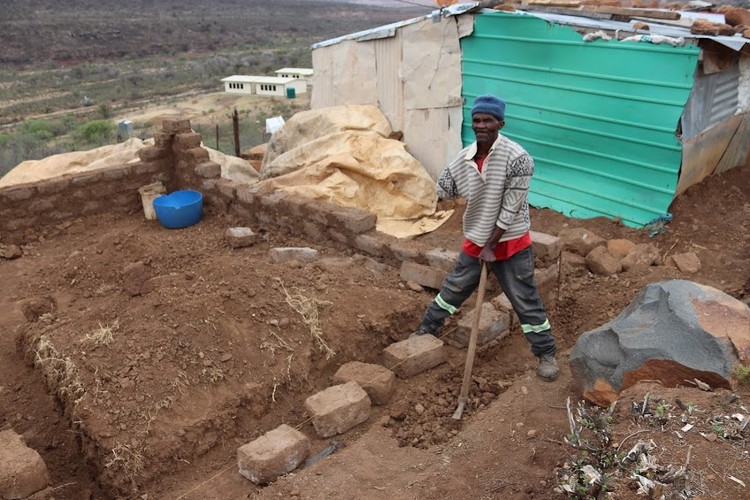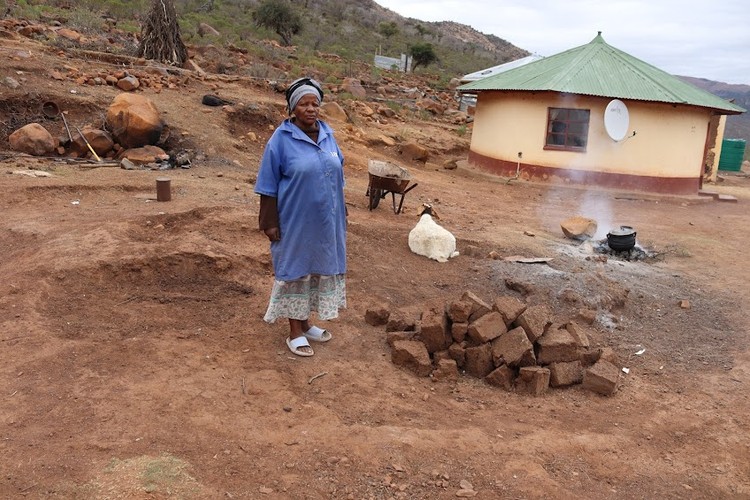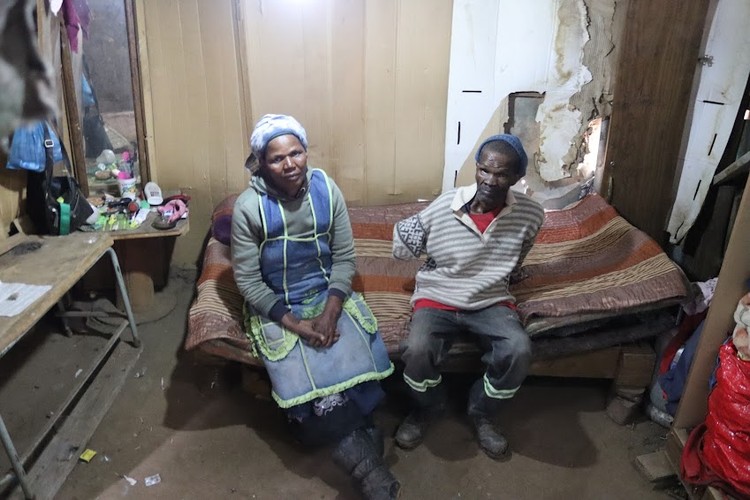One-armed man has to build his own house
Cofimvaba villager Bongani Mgqebisa has given up waiting for an RDP house
Bongani Mgqebisa is building his own house. Photos: Nombulelo Damba-Hendrik
- Tshakana villager Bongani Mgqebisa, who lost his right arm in an accident, is building his own house.
- He and his wife are among many who had hoped to benefit from a huge housing project in Cofimvaba.
- The project, started in 2015, is now nearly complete.
- But many people, including some, like Mgqebisa, with disabilities, say they have been left out.
Bongani Mgqebisa has only one arm. But for the last seven years he has been trying to build his family a two-bedroomed house, one mud brick at a time.
Mgqebisa, 59, lives with his wife Ntomboxolo Diko in a shack in Tshakana village in Cofimvaba, in the Eastern Cape. He lost his right eye and right arm in an accident which also damaged his right leg. The couple, who survive on his disability grant, had hoped to benefit from a huge housing project in the area.
“I started building this house in 2018,” said Mgqebisa. “As you can see, I’m using one hand.”
He said at least now there was water in the village to make the bricks. “When I started, my wife used to fetch water from the river, close to 2km away. While my wife was fetching water, I would be busy digging the soil to make the mud. We would then help each other make the bricks,” said Mgqebisa.
Diko said in 2021 heavy rains destroyed their wall. She said at that time they were saving money for roofing.
“After the destruction of the wall, we stopped. We just gave up but we are starting again this year,” she said. They have two daughters, both in Cape Town.
The shack they live in has holes in the walls and in the roof. Diko said when it rains water comes in.
The couple was hoping to benefit from a project to build 1,000 houses in villages around Cofimvaba. The R151-million tender was awarded by the Eastern Cape Department of Human Settlements to Lima Rural Development Foundation in 2015, and completion of the project, scheduled for 2017, was extended to 2021.
According to an engineer at the Foundation who did not want to give his name, all but two of the Tshakana houses have now been completed. He said the company had left the site because their contract with the department had expired.
“We’re engaging with the Department of Human Settlements to see how and when we can come back to finish,” said the engineer.
But Mgqebisa and Diko were not among the beneficiaries.
Neither was Nosebenzile Dantile, 62, who says she was told in 2019 to destroy her mud rondavel to make space for an RDP house.
Five years later, Dantile has not received the house. She is living in a house made of mud bricks.
“Even though my rondavel was made of mud, we were using it. I only destroyed it because they promised to replace it with a proper house,” said Dantile.
Nosebenzile Dantile says she was told to demolish a rondavel to make space of an RDP house but it was never built.
When GroundUp visited the village last week a meeting was quickly called, attended by about 20 villagers.
Mzokhanyo Ludziya, 33, relies on a disability grant. He walks with a limp and cannot use his right hand.
He says he registered for a house at the Komkhulu (chief’s place). There had been a second registration at Lubisi, 17 km away but he could not get there. “I could not go there, but asked one of the community members to take my ID so he could register me. I don’t know how that went, but the person I asked is also waiting for a house,” he said.
Phuza Funani, 64, is also hoping for a house. He lives in a shack which leaks, and when it rains he sleeps on a chair. The water has destroyed his electricity.
“We are voters and I never missed any elections, I always vote. The unfortunate thing is that I vote for people who only care for themselves, not the people,” he said.
One of the Tshakana elders, Taliyani Mnqabisa, said some people who had been promised houses but had not got them, others had been “sidelined”, and still others were waiting for shelter after their houses were destroyed by heavy rains.
He said he was one of those who had been “sidelined” because he could not walk the 34km to and from Lubisi to be registered. “This is a village, there are no taxis, we were forced to walk.”
Asked if people had been told to demolish mud houses to make space for RDP houses, the engineer said: “I don’t think this is true. I wonder if it has more to do with the safety of the structures.” He said an RDP house was usually additional accommodation on the plot and was built on on a spot chosen by the beneficiary.
Regarding people with disabilities who are still waiting for houses, the engineer said the Department of Human Settlements had instructed the company to focus on those families first. “So the ones that were in our contract would have received theirs before other people.”
Questions sent by GroundUp to the Department’s communication officers, Siyabonga Mdodi and Phiwokuhle Soga, last week Tuesday have not yet been answered, in spite of several reminders.
Bongani Mgqebisa and Ntomboxolo Diko live in a leaking shack.
Support independent journalism
Donate using Payfast

Don't miss out on the latest news
We respect your privacy, and promise we won't spam you.
© 2024 GroundUp. This article is licensed under a Creative Commons Attribution-NoDerivatives 4.0 International License.
You may republish this article, so long as you credit the authors and GroundUp, and do not change the text. Please include a link back to the original article.
We put an invisible pixel in the article so that we can count traffic to republishers. All analytics tools are solely on our servers. We do not give our logs to any third party. Logs are deleted after two weeks. We do not use any IP address identifying information except to count regional traffic. We are solely interested in counting hits, not tracking users. If you republish, please do not delete the invisible pixel.



